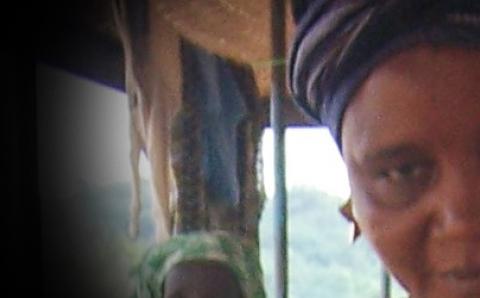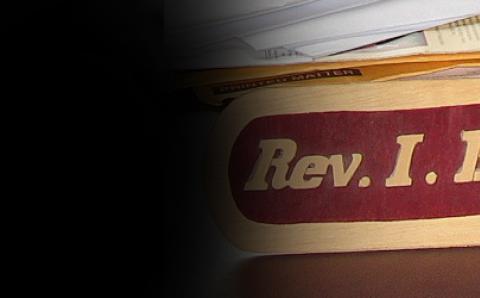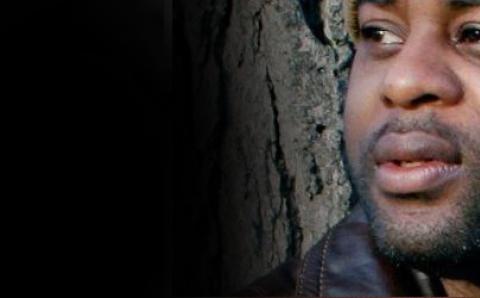A late January ice storm could not dampen the warmth of Saramae Vander Ark’s return to the church her father served during the Great Depression.
Though the storm cancelled an official event, Vander Ark was able to return to Leighton (Iowa) Christian Reformed Church to receive a quilt that was originally presented to her father, Rev. Cornelius Witt, who served as pastor of the congregation from 1929-1937. She spent an afternoon visiting old friends and sharing old memories.
A quilt presented to Rev. Cornelius Witt about 75 years ago shows the names of descendants who are still church members today.
“My dad served during the Depression,” Vander Ark said, “but the church was like a loving family who supported us so well.”
Leona Vande Voort and Francis De Jong, now both 80, were members of Leighton CRC during that time and still are. Together with John De Rooi, a member of the church during Witt’s tenure, they welcomed Vander Ark back. While they were quick to recall times with one another when they were young, no one quite recalls the story behind the quilt.
“We believe it was made in 1933,” Vande Voort said. “The fabrics used seem to be feed sacks. It appears it was hand pieced and quilted—very nicely done. It took a long time to make, I’m sure.”
There are also names on the quilt of members from another nearby church, which Vander Ark said led some to believe it was done in connection with a daily vacation Bible school Witt started.
“We always called him Rev. Witt, never Cornelius, which would have been a disgrace to his office,” said Vande Voort. “I don’t recall an unkind word about the family. Once or twice a year my parents would have the family over for the noon meal, and we often gave meats and produce from the garden, as did several other families to help the pastors out one way or another.”
Witt started several young people’s groups and a choral society during his time at Leighton CRC. He preached sermons in both Dutch and English.
In addition to the quilt, now on display at Leighton CRC, the congregation shared passages from Witt’s journal in which he describes the hardships and joys of serving the church:
“On the 4th of March 1933, all the banks in 44 states were closed by order of the new President, F D. Roosevelt. Our Leighton bank weathered the storm but the main bank in Pella went broke. For some reason we had put a $5.00 birthday gift of Saramae in that bank and lost about half of it. This started also at our little bank, but the cashier, Mr. Vander lindon, to those who came to get their deposits, said that they could have their money, but he would not welcome their business when things got straightened out. The worried depositors by and large went home empty-handed. For a long time many Pella business men came to Leighton to do their banking.”
Excerpt from Rev. Cornelius Witt’s Journal
Our Ministry in Leighton, Iowa
Early in September of 1929 we were settled in Leighton with our little son, John Edward. It was an enormous house in our eyes. From the front wall of the parlor to the rear wall of the kitchen on the north end it measured 75 feet, and was a full two-story house. The front door opened upon a spacious hall, where was footed a splendid stairway that curved to the second floor with its study, three bedrooms and a bathroom, in addition to two smaller rooms—one of which had served as a sewing room, and opened up to a small balcony. A narrow stairway led from the dining room to the rear of a hallway which ran all the way through the upper story. We used the parlor as a spare bedroom, and we slept in a large bedroom to be found on the east side downstairs. In the living room we placed our piano against the closed double doors that led to the parlor. The dining room was of equal size—18 by 18 feet, as was the kitchen.
The last named was provided with two small additions, in one of which the water pump and sink were to be found, and in the other a dumb-waiter which led to the basement fruit storage room.
Shortly after we came to live there, the pressure pump—which easily froze up in the winter—was relocated to the dumb-waiter room in which a new sink was installed and dishes could be washed facing a double window. The first little auxiliary room now became the children’s play room. It was a lovely arrangement.
There was no upstairs room above the kitchen, nor basement underneath. In later years, long after we left, the kitchen was removed, and its equipment was relocated in the downstairs bedroom. The basement consisted of two or three large rooms, and the house was heated with a soft coal furnace. You can imagine how dusty it was. Every Monday morning we had to carefully sweep the laundry room before we could sort the clothes for washing.
A small glass-enclosed porch jutted out from the kitchen. Down this stairway, every Monday morning, we carried a boiler full of hot water, I on the lower end. This had been brought to the boiling point on a kerosene stove. It was a dreadfully dangerous procedure, but we were young, and were careful and never thought much of it. This two-burner oil stove I would light early in the morning and would return to bed until 7, at which time the water was boiling and ready for use. One morning we awoke at 6:30 and could scarcely breathe. The burners had mal-functioned and had begun to create a nasty smoke that pervaded the house. Soot clung to the curtains and walls. You can imagine somewhat what a house-cleaning task we had that day.
My study was at the head of the front stairway just north of the lovely south bedroom, with a large double window. It had a fine bookcase and in it I placed my young library. There was room to spare. Here I labored to produce two sermons every week. Mr. and Mrs. A Pousma of Denver sent us a check for $100 to purchase books, but since I had no desk, we bought with it the beautiful walnut desk and two chairs which I have used all these years. We got them at wholesale through the mediation of another friend from an office furniture manufacturer in Grand Rapids.
Sermon making required much of my time. Every other Sunday I had to conduct two Dutch services and the intervening Sundays called for one sermon in English and the other Dutch. The people of the Pella area had retained a knowledge and love for the language of their fathers, although the original settlers had come in the area from 1847 on, and especially in the 70s and 80s, Leighton being the second congregation established outside of Pella in 1893.
Business people in the city of Pella were wise to employ personnel that could speak Dutch. Many young people were bilingual. But clinging to the language of the fathers in church services was detrimental to the congregation, for there were those who understood it insufficiently and had left our church to join the Reformed Church, which became all English in the 1930s.
Early in that decade I proposed to preach an extra English sermon in the evening, every other week. This we did for a year, and in 1936 switched to 50/50. That satisfied most of the people, but a few refused to come to the English service to the very end of their lives.
Our salary was set at $1,600 plus $100 for auto expenses. On that basis we received something like $140 per month, and that was sufficient to take care of all our needs. We were determined to start saving a few dollars each month, and were indeed able to do so for a time. But in October of the same year our ministry began the Stock Market crashed. The result thereof was widespread, but it did not immediately affect our salary. We were paid in full that year and the next we were able to send $15.75 per month to Investors Savings which was to produce $25 for each of the months at the end of ten years. As time went on money became even more scarce, and we lowered our salary to $1,450 in 1932, and to $1,000 in 1933.
Saving money was out of the question for a long time. It took us ten years to complete our investment program.
Our household budget for 1933 included $18 per month for groceries, and we managed to run our car for $8.00 per month. We owed money to Classis for the support it had given while studying at Calvin. We were able to pay $50.00 the first year, whereupon Classis decided to consider the rest, $650.00, a gift. That was quite a relief.
Shortly after Saramae’s birth in 1930, we bought a refrigerator, since we had a lot of trouble with milk becoming sour. This cost about $260.00, and we promised to pay this sum at the rate of $20.00 a month. This we managed quite well until there was a balance of $100.00 due to the store, and we were totally unable to pay it. A year went by. The church owed me $100.00 on the reduced salary of the year before. I finally asked the consistory to come to my aid, which it did. The $100.00 check I turned over to Mr. Vanden Berg, and we vowed never to buy anything on time again.
Quite often the treasurer could not pay our monthly salary in one piece, and at one time he was three months behind. Obviously we had difficulties paying our bills now and then. We shall always remember with appreciation that Henry Kuperus, our grocer, was willing to give us credit for a time. The people simply did not have much money during the Depression. Corn brought 10 cents a bushel at one time. Some of the farmers lost their farms in those days, and throughout the country millions were out of work. Our congregation counted about 50 families, but the regular offerings—in distinction of the budget—generally came to about $5.00. People put off paying the pledges to the budget in the hope that the crops in the fall would enable them to do so, but these often produced but little. Yes, those were hard times, yet we must gladly acknowledge that we never missed a meal. Quite often we received gifts in the form of meat and eggs, and that was appreciated very much.
While we were here in Leighton, two of our children were born—Saramae came on the 31st of July, 1930, without benefit of a doctor’s services. I did not call Dr. Williams early enough and as a result the delivery was accomplished in the presence of her father and dear Mrs. Plate, who was always helpful to us. The doctor was kind enough to cut the bill by $50.
It was the custom of many people to use Mr. Kuperus’ Oskaloosa telephone to avoid paying the toll. We also did so, and when the birth was imminent I ran to the store instead of using our Pella phone. Was I ever excited! I sent out announcements that day, dating her birth as July 29 instead of July 31.
Our Junior—Cornelius James, named after his father and grandfather—was also born in the parsonage, on the day before the glorious Fourth, in 1933. He had a ruddy countenance and black hair. We paid the doctor at the rate of $5.00 per month.
In January of 1934, the men of the congregation cut down a number of black oak trees on the farm of Peter Van Englenhoven for our benefit. So for a while our salary of $1,000 was supplemented with good fuel. The next year they did the same thing, but the trees were of the elm variety. There was no time to season the wood, and we had a hard time warming the house. Often I wore my overcoat and gloves while in the study. So in 1936 the salary was raised to $1,200 and we had to pay for our own coal again. All in all we got along just fine and found no reason to complain.
But let me turn away from these matters to note certain events that occurred in those early years in our ministry in Leighton. They were good years despite poverty and discouraging experiences. I found it difficult to write two sermons every week in addition to all the other work. The minister in those days had to lead every society in the study of God’s Word, and we were involved in family visitation, which was held every fall, two days a week for about two months. And then there were catechism classes—two every Wednesday evening, and three on Saturday afternoon. On Sunday there was a Sunday School class to teach after the afternoon service, as well as the Young People’s Society in the evening. Moreover, we started a Choral Society soon after we came to Leighton. We sang the songs found in a collection called Winnowed Anthems, with which we had become familiar in Denver.
The congregational singing was accompanied by a reed organ played by either of two young ladies, but there was no music prior to the service. After some months I persuaded the consistory to introduce that, and this was continued despite the protests of one of the elders, who insisted that the organ gave forth an “uncertain sound.” This was in reference to 1 Corinthians 14:8 no doubt. The girls received $10.00 per year for their faithful work.
This same elder was a stern man but well-versed in Scripture and the Creeds. The first day we went on Family Visitation he assured me that he would take charge, and that was a great help to me, for I had received no instruction in this part of my task. As a matter of fact I had a very good and capable set of elders on whom I could depend to be of constant help in this responsible task.
Having been interested in the Young Men’s Federation and involved in the operation of its Board while still a student, I got several societies of young men started in our area. And in due time the Pella league of Young Men’s Societies was organized, consisting of nine clubs. Until we left for Hull in 1937, I had the privilege of heading that organization. The Board arranged for two lecture meetings each year at which prominent leaders in the Church addressed large crowds of people, young and old. Hence we had the joy of entertaining such men as Professors Berkhof, Volbeda, and Bouma in our home. Besides these lecture meetings for the public, there were membership meetings at the time of Classis so that we could call on ministerial delegates such as Rev. Van Dellen to address us.
A couple of years after the young men’s league was called into being, the young women organized in a similar fashion. Jeannette had a hand in that, and became its president and remained such until we left the area. Sometimes the two leagues met together and every summer we had a combined picnic attended by hundreds of young people. Now and then we still meet people who recall with joy their participation in the meetings of the Leagues as well as the Federation Conventions. On New Year’s Day 1932, Mr. Richard Postma, President of the Young Men’s Federation, later the Director, was in our area and spoke in several churches. I took him to Sully that evening. The road was muddy and number present at the meeting was small. Enthusiasm for the broader organization was not great in our societies, but it was tops for the Leagues.
On January 30 of that year, something very exciting happened that could have ended in deep tragedy. Our roof caught fire from a chimney spark. A man walking by, Jette De Jong, saw the smoke and sounded the alarm. I climbed into the attic with a pail of water and tried to extinguish the fire from inside. In a few moments the men of the village came rushing toward the parsonage with ladders and pails, and soon the fire was put out. At the congregational meeting just a few weeks earlier, the decision had been taken not to put new shingles on the parsonage roof—money being a scarce item. Another meeting after the fire, in August, reversed that decision unanimously! You can get an idea how scarce money was when I tell you that the shingles cost a little over $100.00 and it was months before the treasurer could pay the bill. The carpenter spent four days laying the roof, and charged $16.00.
It was at this time that I had the experience of teaching a young man, who had come from the “outside” to marry one of our girls, the way of salvation. Throughout this winter I also taught catechism in a school house on Tuesday afternoon. The children were not all of our church but all the parents were happy to have them instructed by me because it was quite a chore to bring them to the church on Saturday afternoon. A few times the roads were so bad that I could not make the trip, and once I walked a couple of miles from the paved road to the school for the same reason. In the spring the parents surprised us, bringing chickens, eggs, butter and meat. We spent a happy evening together.
In the Fall of 1932 the Girl’s Society was engaged to serve the noon luncheon at the Corn Husking Contest of the County, which occurred on Barney Memmelaar’s farm. They were prepared to sell hundreds of meals, but alas the contest was over early and nearly all the people left before 12 o’clock. Hence only 140 people stayed to eat, and girls made no money, though they did break even. I brought many pies back to Vander Ploeg’s Bakery, and happily the owner was willing to accept them since he could use them at a certain meeting that evening. Never count your chickens before they are hatched!
All through the year I had to prepare at least two sermons a week and was therefore always pleased when I had a Classical appointment. That gave me a breathing spell. It happened a couple of times that I had a sermon or even two prepared in advance. But I discovered that this caused confusion in my mind on the pulpit. I had a vague notion one time that I was preaching the wrong sermon, or at least portions of it, though this never actually happened.
On the 4th of March 1933, all the banks in 44 states were closed by order of the new President, F D. Roosevelt. Our Leighton bank weathered the storm but the main bank in Pella went broke. For some reason we had put a $5.00 birthday gift of Saramae in that bank and lost about half of it. This started also at our little bank, but the cashier, Mr. Vander lindon, to those who came to get their deposits, said that they could have their money, but he would not welcome their business when things got straightened out. The worried depositors by and large went home empty-handed. For a long time many Pella business men came to Leighton to do their banking.
Early in 1934 three of our young married men helped me build an ornamental fence in the northeast corner of our yard, and we constructed a lovely pool and rock garden. It was a beautiful sight and we called it Stoney Point and Dream Pool. There was a chicken coop in that same area and we fixed that up to be a playhouse for the children, and close to it built a small bathing pool for their enjoyment. It was about 4 by 6 feet and 6 inches deep. In it we poured water on a hot day and in a short time it was at the right temperature for their use.
The year 1934 is remembered, even in Iowa, for the rainlessness and dust storms. All summer we prayed and waited for the rain to come. At one time we held a prayer service in the Reformed church. We went home in the rain! The event was recorded in the De Moines paper, and I got a phone call from New York to verify that this had indeed occurred. Not until September, much too late for the grain crops, did we receive an abundance of rain, however, and then miraculously whatever vegetation was still living turned beautifully green.
Our interest in youth work we have already alluded to. It led Jeannette to arrange for the attendance of some 40 girls to one of the first Young Women’s Conventions, held in Holland, Michigan, in October of 1934. Money being scarce, the trip was made in Buwalda’s moving van. They did not arrive at their destination until 3 o’clock in the morning, and slept on the pews of the Maple Ave. Church. When they traveled on gravel roads, the doors had to be closed and the girls sat in darkness. The trip was a true adventure and the Convention a rich blessing to all who participated.
On Sunday, the 23rd of December, I was sitting in my study preparing for the afternoon service when I heard the cry, “FIRE.” Looking out I saw that the Reformed church was aflame. So swift was the progress of the fire that next to nothing was saved, and within a half hour the structure had burned to its foundation. Strenuous efforts were made to save our house for sparks were raining on to the roof constantly. The tragic event brought our two congregations closer together. For months they used our facilities while their new church was being constructed.
An interesting event in 1935 occurred when our small choral group of twenty voices gave the cantata “Ruth, the Moabitess,” on March 20 to a very full house. It was so well received that we sang it again on the 4th of April. Our plans were to sing it in February that year, but just two days before the date set, Gerrit Vander Wilt, one of our singers, had an accident that was almost fatal. His wife was our accompanist. Hence the project was postponed about six weeks.
Until the end of 1935 the offerings in the church were collected by means of pouches attached to a long pole. The young people in the Choral Society had refused to use them when they rendered a program in earlier years, and we purchased two collection plates. The Deacons were eager to use them in the services, and since the pouches were wearing out, Herm Meppelink’s wife Grace, who usually repaired them, cooperated by assuring the elders that they were completely worn out! So, against Willem De Witt’s contention that the right hand should not know what the left was doing, the plates came in constant use. We never heard any further objections.
October brought another Young Women’s Convention—his one in Chicago. Jeannette addressed the hundreds of girls assembled there on “loyalty in Our Vocations.” It was so well received that she spoke it on several occasions, first of all at a combined meeting of our two Youth leagues held in Pella with an attendance of over 360 young people. I had a similar experience, speaking at the Young Men’s Federation Convention in the previous year, which was held in Chicago. I visited the World’s Fair held there at the same time, together with a couple of delegates who had come with me. Those were exciting events for us both.
Both of us were given abundant opportunity to write in the course of the years. Perhaps the first such experience was presented when I was asked to be the Correspondent for “De Wachter,” covering the congregations of Classis Pella. But more important was Rev. M. Monsma, pastor of Second Pella Church, inviting me to join him in a new venture started in 1936, that of publishing a calendar composed of meditations for each day of the year. 52 ministers would each write a series of seven, and I wrote such a group of meditations beginning in 1937 until the publication was discontinued because of strong competition. Some of the meditations have recently been republished in booklet form, concerned with a specific general topic. My involvement therefore lasted 42 years.
Moreover I was responsible for a weekly page in “De Wachter” for 13 years—at first giving an explanation of the Sunday School lesson, and in later years presenting a review of what was going on in the mission fields of the world. Articles for the Youth Page in The Banner kept me busy for four months each year for six years. In addition I had the joy of writing the summer outlines for Bible Study in the Young Calvinist Magazine for a couple of years. A series of outlines in Dutch on First and Second Peter was published in booklet for use by the Ladies organizations in Canada, Jeannette, too, became a contributor to The Banner and wrote three full-page articles annually on the Woman’s Page for seven years.
A new year 1936 dawned. Jeannette did not feel well, and a trip to Dr. Williams revealed that she needed an operation for the removal of an ovarian cyst. This occurred on the 4th of February, on a very stormy day. I had difficulty getting to the hospital and the surgery was held up for an hour on my account. Those were difficult days, for she was in the hospital for a total of 27 days. Iowa was deluged with snow for weeks and a group of men sallied forth from Leighton almost every day for a while to clear the two-mile road leading to the highway that connected us with Oskaloosa and Pella. Every night the wind undid their efforts. Finally they decided to break down fences where necessary and blaze a roadway through the fields. Just before that plan was to be executed the boisterous storm ceased and we could travel again. The entire hospital bill came to $84.00, and had to be paid piecemeal. We were deeply grateful to the Lord for sparing her life.
Our work with youth was always important to us. We were brought close together in our teaching ministry. And occasionally we went on an outing with them. Outstanding was the trip to ledges State Park late in May of 1936. Those who participated still remember it with deep joy.
We had often talked about the reestablishing of the Christian School in our area. We had a building which had been used one year—1917. The next year the Board could not get a teacher. They appointed Jeannette Schoolland who had just graduated from the teacher’s course at Grundy College, but she accepted the appointment tendered her by the Denver Board. In consequence of this failure to get a teacher on time, the children returned to the public schools which they had attended in previous years. She never dreamed that ten years later we would enter the ministry in Leighton and find there a closed Christian School. The building was used for many church functions, such as catechism and society meetings.
Then in the fall of 1936 we decided we should wait no longer. John and Saramae were to attend the Christian School in Pella. That meant two trips to town five days a week—40 miles each day. To help pay for the gas, I delivered a batch of bread from Sybenga’s Bakery to Kuperus, the grocer, for 27 cents, and received a quart of milk from the Vos family whose two children I picked up along the way and brought to school. What a struggle that was! But the children were delighted with their new teacher and we felt that we were setting a good example. In the course of time more and more people followed it, though not immediately.
We note that the year 1937 was very important to us. We opened a Daily Vacation Bible School that summer which proved to be very successful. Both of us taught three full days per week for nearly a month. Our curriculum consisted of singing, Bible, History, geography, and spelling, all of which was drawn from Biblical material. It worked extremely well. The children learned 18 songs from the Psalter Hymnal, for example, and were able to locate all the important features of the Holy land. We had no books to help us, for the Bible School movement was still new, and we didn’t know of any material that might guide us. Such help we used in other congregations in later years, but we believe our experience in Leighton was the most satisfactory of all. The parents and friends who listened to the closing program were most enthusiastic.
That summer brought the call to become the pastor of the Hull, North Dakota congregation. We visited Hull thereupon, on the way to Colorado. We arrived in the midst of a dust storm on the day that found the people in Haveman’s grove, participating in a Mission Fest. We felt moved by the severe difficulties that the people were passing through. They were mostly farmers and found it hard to make a living, since the drought continued on for years. Quite a number had to depend on a small check they received from the government so they might not abandon their farms.
What were we to do? We had spent eight years in our first charge. Wasn’t that long enough? Wouldn’t it be wise to get a new start, both for ourselves and the congregation? We pondered deeply about God’s will in this matter, but finally decided, after our visit to Hull, that we should make the move. The die was cast while we were in Colorado. After some weeks we left our dear friends in Leighton, preaching a farewell based on 1 Thessalonians 3:16: “The Lord be with you all,” exactly eight years after our arrival.
We left behind many dear friends, chief among them being Cornie and Martha Van Engelenhoven, the Bandstra family, Gerrit and Harriet Vander Wilt, Walter and Anna Steen hoek, and many others. Writing this account in 1983, it may be well to mention that we often return, and when we are there, enjoy a party or picnic with the Youth of Yesteryear, and preach the Word on Sunday. In August of this year there were 44 of us gathered in West Market in Pella on such an occasion.
About the Author
Melissa Holtrop









